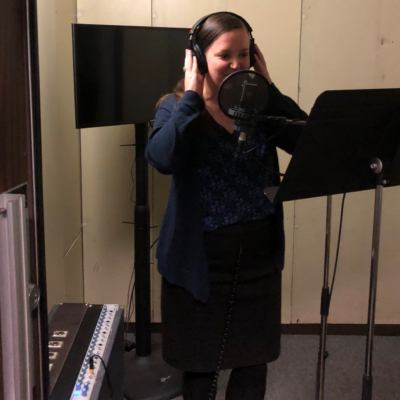| (0:00) |
Music |
[Piano Overlaid With Distorted Beat] |
| (00:09) |
Hannah McGregor |
Welcome to the SpokenWeb minisodes. Each month on alternate fortnights—that’s every second week following the monthly SpokenWeb Podcast episode—join me, Hannah McGregor, and minisode host and curator Katherine McLeod for SpokenWeb’s Audio of the Month miniseries. We’ll share with you specially curated audio clips from deep in the SpokenWeb archives. An extension of Katherine’s Audio of the Week series at spokenweb.ca, Katherine brings her favourite audio each month to the SpokenWeb Podcast. So if you love what you hear, make sure to head over to spokenweb.ca for more. Just in time for holiday Monday listening here in Canada, whether you’re spending time with family or enjoying a solo moment, sit back, relax, and join Katherine McLeod for February’s SpokenWeb Audio of the Month: ‘mini’ stories about how literature sounds. |
| (01:05) |
Theme Music |
[Instrumental Overlapped With Feminine Vocals] |
| (01:10) |
Audio Recording |
[Audio, Maxine Gadd] Well. Okay. Do you want to do, oh, do you want to try, try improvising to, to a chip that’s here? I’ll let you read it. |
| (01:18) |
Audio Recording |
[Audio, Richard Sommer] Seriously, you wanna do that? |
| (01:18) |
Audio Recording |
[Maxine] Yeah. It’s just going to be some [inaudible]. |
| (01:19) |
Audio Recording |
[Richard] I don’t know if I should… |
| (01:22) |
Katherine McLeod |
In this Audio of the Month, we’re traveling back to February 1972, when poets Maxine Gadd and Andreas Schroeder read in Montreal. They read at Sir George Williams University, or what is now Concordia. They read on February 18th in the Hall Building in Room H-651. The reading started at 9:00 PM. Yes, readings started late and they went on for a long time. After reading for about 45 minutes, Maxine Gadd invited the host of the evening, Richard Sommer, to improvise on the flute. He improvised along with her reading the poem “Shore Animals.” Before starting to improvise, we can hear a negotiation between Gadd and Sommer about what to read and how to perform together, a process that is its own audible improvisation. |
| (02:15) |
Audio Recording |
[Audio, Maxine Gadd] Now, how it goes. You have to keep quiet until… [Random Flute Notes] See, now… He’s never done this one before. |
| (02:31) |
Audio Recording |
[Audio, Richard Sommer] What, what, yeah, what do you want me to do then? |
| (02:32) |
Audio Recording |
[Maxine] Okay, this is called “Shore Animals” and it says, “speech feasts peace with flute” and the flute has to listen. |
| (02:38) |
Audio Recording |
[Richard] Okay. |
| (02:39) |
Audio Recording |
[Maxine] And it can pl–, it can speak, too. |
| (02:42) |
Katherine McLeod |
Then the audio clip that you’ll hear includes the first two minutes of a six-minute improvisation. Their improvisation is a singular moment when an audience member—in this case, Richard Sommer—formally performs in the Sir George Williams Poetry Series, though at the same time, this recording reminds listeners that the audience is always present, ready to improvise, to interject, and even to interrupt. And that the audience is also what we are listening to as archival listeners. |
| (03:16) |
Audio Recording |
[Audio, Maxine Gadd] What, the food? I think it’s over there. For fun. [Papers Crinkling] The same message. I, I’m asking… Richard is gonna make some noise with my flute. |
| (03:32) |
Audio Recording |
[Audio, Richard Sommer] I’ll make some noise if you give me your microphone. |
| (03:33) |
Audio Recording |
[Maxine] Okay. Which one you want? Let’s share it. Is– |
| (03:39) |
Audio Recording |
[Richard] It doesn’t make any difference. |
| (03:39) |
Audio Recording |
[Maxine] It goes with a [inaudible]. |
| (03:42) |
Audio Recording |
[Richard] When’d you do that? |
| (03:43) |
Audio Recording |
[Maxine] What? |
| (03:44) |
Audio Recording |
[Richard] This, this knot. |
| (03:45) |
Audio Recording |
[Maxine] I’ve tied myself in there. |
| (03:50) |
Audio Recording |
[Richard] Here we go. |
| (03:59) |
Audio Recording |
[Maxine] [inaudible] I can’t find it. [Long Pause] Pieces, pieces, pieces. Oh, here it is. Now, how it goes. You have to keep quiet until… [Random Flute Notes] See, now… He’s never done this one before. |
| (04:17) |
Audio Recording |
[Richard] What, what, yeah, what do you want me to do then? |
| (04:19) |
Audio Recording |
[Maxine] Okay, this is called “Shore Animals” and it says, “speech feasts peace with flute” and the flute has to listen. |
| (04:27) |
Audio Recording |
[Richard] Okay. |
| (04:27) |
Audio Recording |
[Maxine] And it can pl–, it can speak, too. You have to listen to it, yeah, you never heard it before. |
| (04:34) |
Audio Recording |
[Richard] I think it’s learning how to speak. |
| (04:39) |
Audio Recording |
[Maxine] It’s called “Shore Animals,” it’s a speech piece with flute. [Maxine Begins To Recite, Richard Plays Flute] So hearing where the poppy stopped me, small chance to star spiel, all you have told me, gone, false and beautiful gods and groves. People truth. Put it into song. When the traffic is gone, gone, gone a fleet in in the air. My debt to your tongue, Saturn. In your minds, I’ve split a spleen, lust my lust. Come along, fog. Oh! Soul, I have to whistle to you. [Audience Laughs] [Whistling] |
| (05:36) |
Katherine McLeod |
That was Maxine Gadd reading “Shore Animals” with Richard Sommer improvising on the flute at a reading that took place in Montreal on February 18th, 1972. [Begin Music: Piano Overlaid With Distorted Beat] Head to spokenweb.ca to find out more about the Audio of the Month and how to listen to the entire recording. My name’s Katherine McLeod and tune in next month for another deep dive into the sounds of the SpokenWeb archives. |
| (05:49) |
Katherine McLeod |
[Begin Music: Piano Overlaid With Distorted Beat] Head to spokenweb.ca to find out more about the Audio of the Month and how to listen to the entire recording. My name’s Katherine McLeod and tune in next month for another deep dive into the sounds of the SpokenWeb archives. |
| (06:06) |
Music |
[Piano Overlaid With Distorted Beat] |

